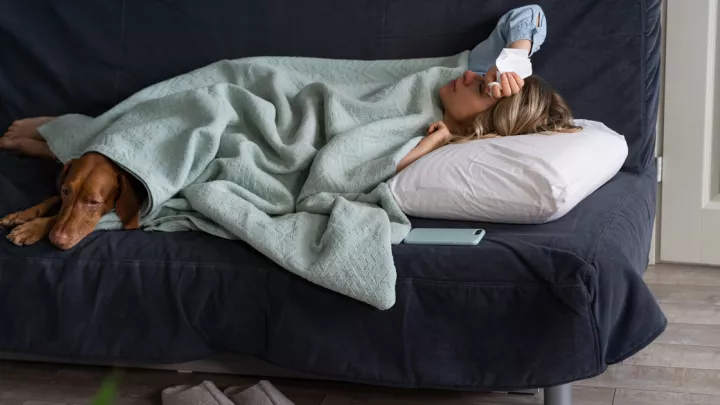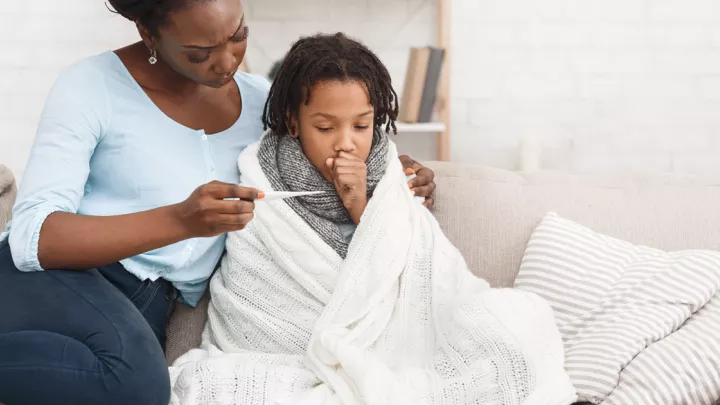Are flu cases rising in Nebraska? What to expect for the 2022 season

Cases of influenza (the flu) are rising in Nebraska and all over the country. Before COVID-19, the flu season would typically peak in January or February. This season, flu cases are rising earlier than typical and growing rapidly.
The Centers for Disease Control and Prevention estimates that, in the United States, there have already been at least 6.2 million illnesses, 53,000 hospitalizations, and 2,900 deaths from flu so far this season.
On an activity scale from "minimal" to "very high," Nebraska is currently in the "very high" category. See the CDC's interactive weekly influenza report by state.
Why are flu rates increasing?
Experts aren't entirely sure, but there is speculation that other factors may contribute to the uptick. One of these factors includes the lack of continuing protective habits like wearing masks, social distancing, or other precautions to keep viruses at bay. In addition, competitive interactions between different respiratory viruses are not well understood. We’ve seen very mild flu seasons over the last several years while COVID-19 has circulated widely.
Are there different kinds of flu?
There are four types of influenza viruses: A, B, C and D. Type A and B are the viruses that cause the most human illnesses and are responsible for the seasonal flu.
What type of flu is going around this year?
"The type A H3N2 virus seems to be the predominant influenza strain this year so far," says Mark Rupp, MD, Nebraska Medicine infectious diseases physician. "Type A H3N2 tends to cause more severe illness than H1N1 or type B strains. Therefore, I strongly recommend vaccination for everyone over 6 months of age to protect themselves and others. Because the flu vaccine contains both A and B strains, it should offer protection even if we see a shift in the type of flu that is circulating late in the season."
What kind of flu virus does this year's vaccine protect against?
This season's flu vaccine protects against the three (trivalent vaccine) or four (quadrivalent) influenza viruses that research indicates will be the most common.
This year the vaccine includes protection for:
- Influenza A (H1N1)
- Influenza A (H3N2)
- Two influenza B strains
Certain people, including adults aged 65 and older, are at higher risk for serious flu complications. Vaccination is especially important for those with obesity, a history of heart disease or stroke, diabetes, asthma or lung disease, immunosuppression or those who are pregnant.
Influenza, COVID-19 or RSV? How do I know which one I have?
Since the main symptoms are similar, including symptoms for respiratory syncytial virus, known as RSV, it isn't easy to know what you're dealing with without testing. You can also be infected by more than one virus at a time. Because treatment is most effective within the first few days of symptom onset, call your doctor to get tested so they can offer the best treatment option.
How can I reduce my risk?
"Evaluate if the activities you're thinking about are worth the risk for you and others," says Dr. Rupp. "We should continue to take common sense precautions as we prepare for the holidays, consider the following actions, particularly if traveling or gathering with others."
Common sense precautions include:
- Wash hands often with soap and water
- Wear a mask when in public, indoors and when using public transportation
- Cover your nose and mouth with a tissue when sneezing or coughing
- Stay home when you are sick
- Avoid touching your eyes, nose or mouth
What should I do if I feel sick?
If you have flu symptoms, stay home and keep your distance from others. Call your doctor's office to make an appointment.
In Nebraska? Schedule an Immediate Care Video Visit. During the telehealth visit, we can order testing so you can drive up to an open Intermediate Care Clinic and, without leaving your car, get tested for the flu, RSV, and COVID-19 all at once.
If you don't have a primary care doctor, call 800.922.000 to make an appointment.






